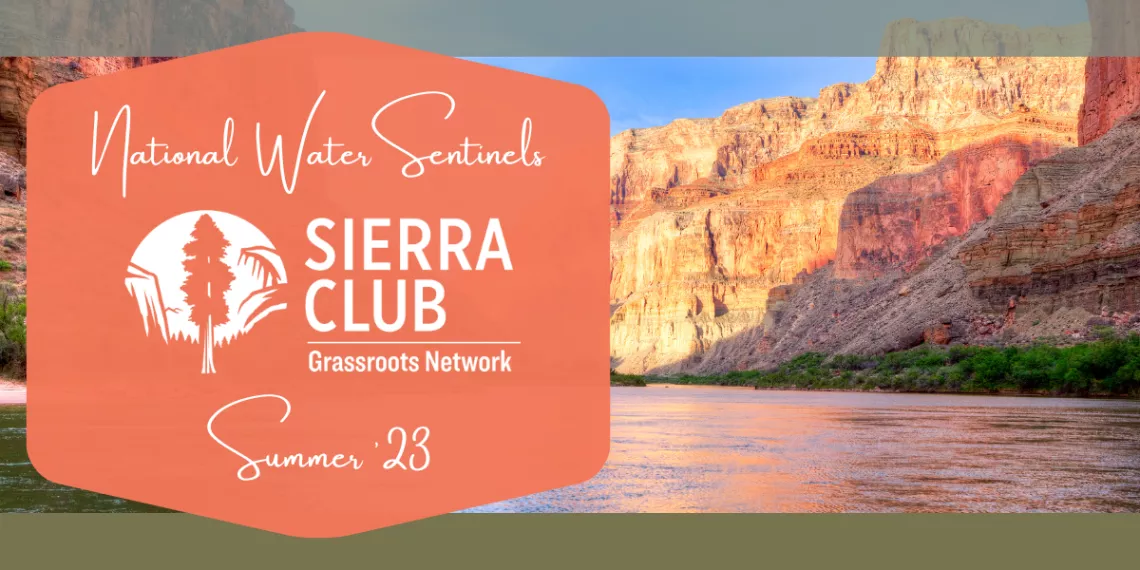
Success Story: Victory at Bloody Run Creek
By Pamela Mackey Taylor, Director, Iowa Chapter
This Spring, the Sierra Club won a court challenge over the siting of a large beef cattle feeding operation near Bloody Run Creek, a treasured trout stream in northeast Iowa. A Polk County District Court judge ruled that the Iowa Department of Natural Resources (DNR) improperly approved Supreme Beef’s nutrient management plan.
The ruling was not appealed. DNR requested that Supreme Beef work on a new nutrient management plan and ordered the company to retain all manure in its storage basins until the new plan is approved.
Bloody Run Creek is among 34 waterways designated as Outstanding Iowa Waters by the DNR. The designated portion of Bloody Run Creek is approximately 6.5 miles long, extending from the Hwy 18 crossing near Marquette, through the Bloody Run Creek Wildlife Management Area (WMA) up to and including the world-famous Spook Cave tourist attraction.
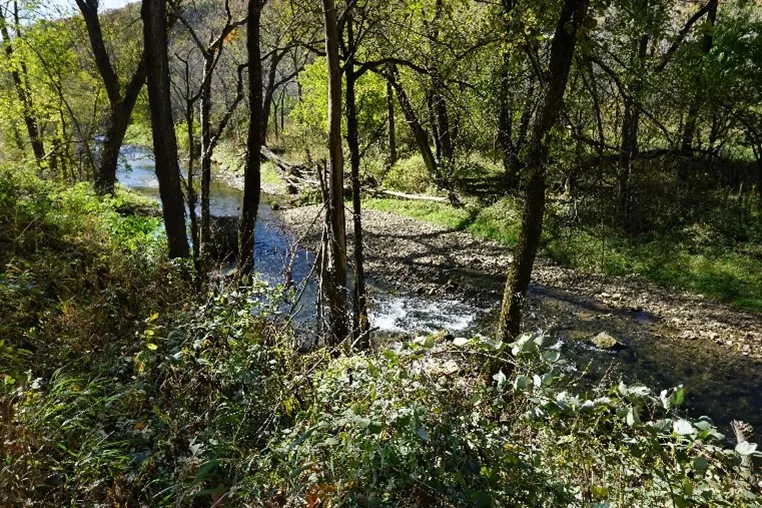
Photo: Bloody Run Creek near Marquette (Clayton County), Iowa - Pamela Mackey Taylor
The Supreme Beef site and much of the manure spreading area are within the “no degradation zone” identified by DNR, which improperly approved a nutrient plan for spreading manure on crop fields. In addition, soils in the area provide potential for polluted surface waters to contaminate groundwater.
The Sierra Club Iowa Chapter won the appeal to stop this open feedlot from being built near one of Iowa’s outstanding waters by relying on citizens who challenged the permit and who advocated for protecting the trout stream. Trout Unlimited joined the lawsuit as an intervenor.
It pays to ask Iowans to join in the fight for the things they treasure!
Nature Snapshot
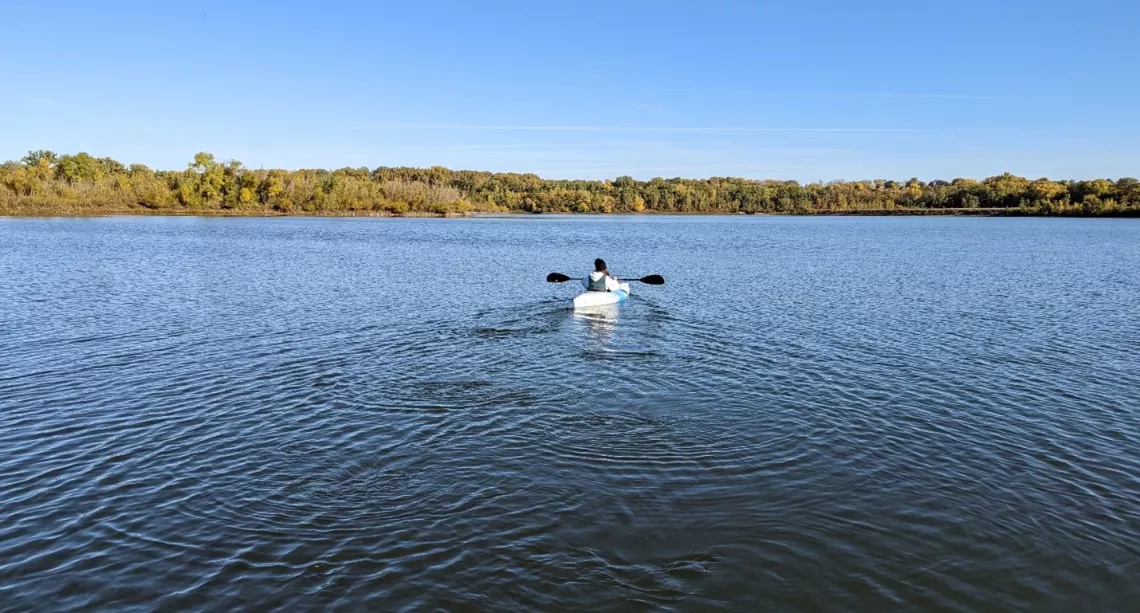
Photo: Kayaking on Purple Martin Lake, Des Moines (Polk County), Iowa - Debbie Neustadt
A Guide to Purple Martin Water Resource Area
Sierra Club’s Colorado River Task Force
By Cary Meister, Chair, Colorado River Task Force, Grand Canyon (Arizona) Chapter
Colorado River management issues finally exploded into the public’s consciousness and caught government interest after decades of lower flows resulting from over-allocation and climate change.
The Sierra Club’s Colorado River Task Force woke from a quarter century of slumber in March 2022, to provide input and advocacy. The Task Force, part of the Western Waters Sub-team of the Grassroots Network Water Sentinels, represents the Sierra Club on basin-wide Colorado River issues and draws on the interests and expertise of chapters in the seven basin states plus the Sierra Club's California Water Committee.
Chapters participating include Grand Canyon (Arizona), Colorado, Toiyabe (Nevada), Rio Grande (New Mexico), Utah, Wyoming, and in California, the Angeles, San Diego, and San Gorgonio Chapters.
So far, the Task Force has primarily been involved in providing comments to the Bureau of Reclamation on the two environmental impact statements that will set water management policy in the near-term (2023-2026) and long term (post-2026) for Glen Canyon and Hoover Dams and their reservoirs (Lake Powell and Lake Mead, respectively).
The Task Force is also expanding beyond that goal, with the help of a Grassroots Network Grant awarded this year, to do the following:
- sponsor a “book club” which will read and discuss a book about the Colorado River,
- host three webinars with speakers or panels expert on Colorado River issues,
- develop a pamphlet on the Colorado River and its issues,
- create a web page where the public can keep up to date and take action on issues, and
- provide a heretofore nonexistent Sierra Club presence at the major gathering of public and private interests in the Colorado River, the annual Colorado River Waters Users Association Conference, to be held in Las Vegas in mid-December.
If you have any questions or comments about the Colorado River Task Force, please contact its Chair, Cary Meister.
Join the Colorado River Task Force Book Club
By Kirk Cunningham, Chair, Water Quality Committee, Colorado Chapter
The Sierra Club’s Water Sentinels Colorado River Task Force, part of the Western Waters Sub-team, is planning an on-line "Book Club" about the drought-afflicted Colorado River, reading Cornerstone at the Confluence: Navigating the Colorado River Compact's Next Century (2022), Jason A. Robison, ed.
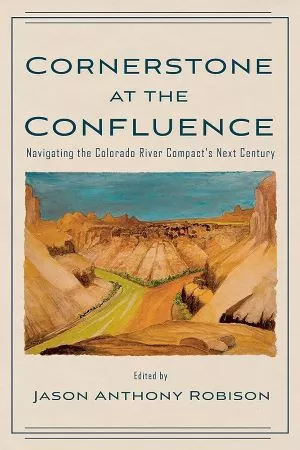
We plan to have one Zoom call per month, for four or five months, starting on September 6, 3-4 pm PT. One does not have to be a member of the Western Waters sub-team to participate.
Cornerstone at the Confluence can be purchased in paperback for about $30 on Amazon. Water Sentinels has a grant to defray the cost of purchase for a limited number of participants.
This book should allow readers to learn more about the Colorado River's historic and on-going management and water allocation issues as the Federal Bureau of Reclamation starts preparing an Environmental Impact Statement in September. Cornerstone at the Confluence deals with four basic aspects of Colorado River management:
- a history of the Colorado River Compact, the political and factual blunders it represents, and how a future version could be crafted,
- a discussion of environmental amendments to the Compact, with particular reference to the Colorado River delta,
- a history of the extensive water rights (in principle) of several Indian tribes in the basin and attempts that have been made over the years to reify them, and
- a vision of a more equitable Colorado River Basin governance structure, taking science more seriously.
For more information or to sign up, contact Kirk Cunningham.
Manitou Creek Naming Commemoration
By Gloria Charland, Co-chair, Manitou Creek Watershed Alliance, Illinois Chapter
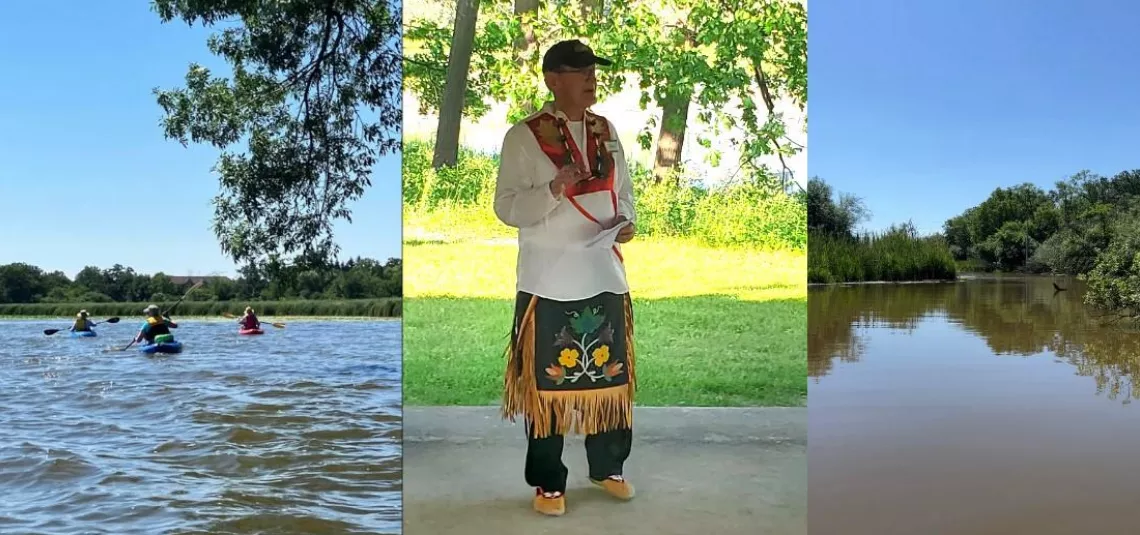
Photo: Manitou Creek Naming Commemoration (2022), Lake County, Illinois - Gloria Charland
After a yearlong effort, the Manitou Creek Watershed Alliance (MCWA), a Sierra Club coalition, was able to change the name of a 17-mile creek located in Lake County, IL, from a derogatory epithet toward Indigenous women to "Manitou" which honors the spirit of the waterway and the lifeblood of the indigenous people of our region.
The effort to change the name of the creek was a communitywide campaign, with residents, organizations, and elected officials supporting MCWA volunteers who advocated for the change. Following community engagement, the official federal application was filed in June 2021 with the U.S. Board on Geographic Names. Approval was announced in early 2022.
Supporters of the name change came together on the summer solstice to hold a special gathering to celebrate the recently renamed Manitou Creek. Jim DeNomie, a citizen of the Bad River Band of Chippewa Indians of Lake Superior, performed a special blessing ceremony for the new name.
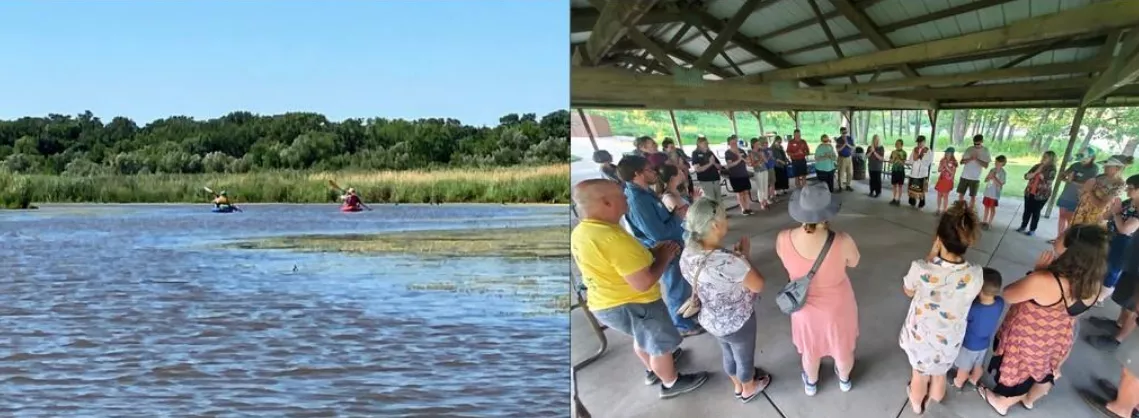
Photo: Manitou Creek Naming Commemoration (2022), Lake County, Illinois - Gloria Charland
May we all commit ourselves to developing deeper partnerships that advocate for the progress, dignity, and humanity of the many diverse Native Americans who still live and practice their heritage and traditions today. Being aware of the issue was primary. Secondary was knowing the steps we needed to take, followed by filing the paperwork and generating the needed support from the grassroots.
We learned how good it feels to do the right thing.
We invite you to contribute to a future edition of our newsletter.